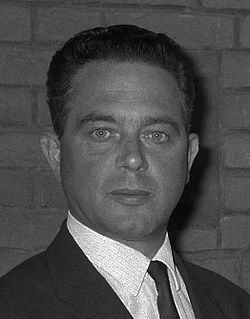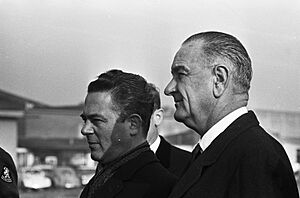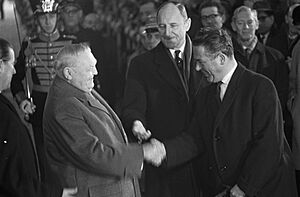Victor Marijnen facts for kids
Quick facts for kids
Victor Marijnen
|
|
|---|---|

Victor Marijnen in 1963
|
|
| Prime Minister of the Netherlands | |
| In office 24 July 1963 – 14 April 1965 |
|
| Monarch | Juliana |
| Deputy | Barend Biesheuvel |
| Preceded by | Jan de Quay |
| Succeeded by | Jo Cals |
| Mayor of The Hague | |
| In office 16 October 1968 – 5 April 1975 |
|
| Preceded by | Hans Kolfschoten |
| Succeeded by | Gerard Wallis de Vries (Ad interim) |
| Chairman of the Rijnmond Council |
|
| In office 20 May 1965 – 16 October 1968 |
|
| Preceded by | Office established |
| Succeeded by | Willem Fibbe |
| Member of the House of Representatives |
|
| In office 27 April 1965 – 14 January 1966 |
|
| In office 2 July 1963 – 24 July 1963 |
|
| Parliamentary group | Catholic People's Party |
| Minister of Social Affairs and Health |
|
| In office 3 July 1961 – 17 July 1961 Ad interim |
|
| Prime Minister | Jan de Quay |
| Preceded by | Charles van Rooy |
| Succeeded by | Gerard Veldkamp |
| Minister of Agriculture and Fisheries |
|
| In office 19 May 1959 – 24 July 1963 |
|
| Prime Minister | Jan de Quay |
| Preceded by | Kees Staf as Minister of Agriculture, Fisheries and Food Supplies |
| Succeeded by | Barend Biesheuvel |
| Member of the Social and Economic Council |
|
| In office 1 November 1957 – 19 May 1959 |
|
| Chairman | Frans de Vries (1957–1958) Gerard Verrijn Stuart (1958–1959) |
| Personal details | |
| Born |
Victor Gerard Marie Marijnen
21 February 1917 Arnhem, Netherlands |
| Died | 5 April 1975 (aged 58) The Hague, Netherlands |
| Cause of death | Heart attack |
| Political party | Catholic People's Party (from 1945) |
| Other political affiliations |
Roman Catholic State Party (until 1945) |
| Spouse |
Mini Schreurs
(m. 1944) |
| Children | 4 sons and 2 daughters |
| Alma mater | Radboud University Nijmegen (LL.B., LL.M.) Rotterdam School of Economics (BEc) |
| Occupation | Politician · Civil servant · Jurist · Economist · Trade association executive · Nonprofit director |
Victor Gerard Marie Marijnen (born 21 February 1917 – died 5 April 1975) was a Dutch politician. He was a member of the Catholic People's Party (KVP), which is now part of the Christian Democratic Appeal (CDA) party. Marijnen served as the Prime Minister of the Netherlands from 1963 to 1965.
He studied Law at the Radboud University Nijmegen. He also studied Agricultural economics at the Rotterdam School of Economics. Before becoming a politician, Marijnen worked as a civil servant for the government. He also worked for farmers' and employers' associations.
In 1959, Marijnen became the Minister of Agriculture and Fisheries. After the 1963 election, he was chosen to lead a new government. He became Prime Minister on 24 July 1963. His government, called the Marijnen cabinet, lasted for about 19 months.
After his time as Prime Minister, Marijnen continued to be involved in public life. He was a Member of the House of Representatives. In 1968, he became the Mayor of The Hague. He held this position until he passed away from a heart attack in 1975, at the age of 58.
Victor Marijnen was known for being a good manager and someone who could help people agree. During his time as Prime Minister, his government made important changes. These included reforms to health insurance and the public broadcasting system.
Contents
Biography
Early Life and Education
Victor Gerard Marie Marijnen was born in Arnhem, Netherlands, on 21 February 1917. He completed his law degree at the Radboud University Nijmegen in 1941. After his studies, he started working for the government. He worked in the accounting departments of the Ministry of Agriculture, Nature and Food Quality.
In 1945, he helped with the Council for the Restitution of Legal Rights. Later, in 1949, Marijnen became the secretary of the Agricultural Society. In 1951, he became the Secretary-General for Foreign Agricultural Trade. From 1957, he worked as a secretary for Catholic employers' associations.
Political Career


Victor Marijnen began his national political career as the Minister of Agriculture and Fisheries. He served in this role in the De Quay cabinet.
He then became the Prime Minister of the Netherlands on 24 July 1963. He held this important position until 14 April 1965. During his time as Prime Minister, the Netherlands saw a big boost to its economy. This was thanks to the discovery of large natural gas reserves in Slochteren.
The economy was growing, and there was a labour shortage, which meant more jobs were available. This led to higher wages for workers. Even though his government did not include the socialist Labour Party, they continued to build the welfare state. This meant introducing new social programs. For example, minimum wages were set in 1964. A national health service was also put in place.
One challenge during his time was dealing with commercial television stations. These stations were broadcasting from the North Sea. The government took steps against them in 1965. The Marijnen government eventually ended because of disagreements over whether commercial TV should be allowed in the Netherlands.
Later Roles and Death
After his time as Prime Minister, Marijnen became a member of the House of Representatives from 1965 to 1966. At the same time, he was the chairman of the Rijnmond Authority. In 1967, he also became the chairman of the Post and Telecommunications Council.
On 16 October 1968, Victor Marijnen was chosen to be the Mayor of The Hague. He served as mayor until his death. He passed away on 5 April 1975, in The Hague, at the age of 58, due to a heart attack.
Awards and Honors
Victor Marijnen received several honors for his public service.
| Honours | ||||
| Ribbon bar | Honour | Country | Date | Comment |
|---|---|---|---|---|
| Grand Officer of the Order of Orange-Nassau | Netherlands | 20 April 1965 | ||
See also
 In Spanish: Victor Marijnen para niños
In Spanish: Victor Marijnen para niños
 | Kyle Baker |
 | Joseph Yoakum |
 | Laura Wheeler Waring |
 | Henry Ossawa Tanner |

